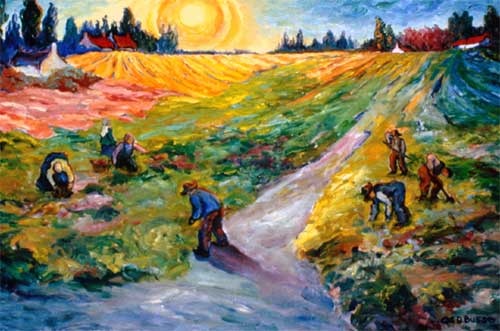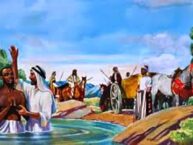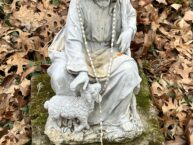 September 24, 2023: May God’s words be spoken, may God’s words be heard. Amen.
September 24, 2023: May God’s words be spoken, may God’s words be heard. Amen.
Every time this passage from Exodus comes up, I just want to sing “It’s raining quail! Hallelujah!” Never mind.
So, maybe let’s focus on the gospel instead, which is one that can often challenge our notion of what is just, what is fair, what is good.
Jesus is telling a parable about a landowner and the laborers he hires to work his fields. This landowner goes out several times during the day, finding laborers, who he then sends to work in his vineyard. In the morning he hires some, then again at noon he finds workers, and also at around 3pm, and finally, at about 5pm, even more – sending those last ones into the fields as he had the first ones. When it was time to pay them, they all got the same wages. Those hired first were angry – not with the other laborers – but with the landowner. They told him that it wasn’t fair that these latecomers got the same wage.
Now, you would not be alone in siding a bit with those folks. I mean, after all, they were out there, as they said, in the hot sun a lot longer than those hired later. Why shouldn’t they get more?
Perhaps in our own lives, we can think of folks who work at the same place we do, but don’t do nearly as much work. Yet, they get more money. Women in the workplace will tell you that happens all the time. Then there is the inequity of pay that defies even our imagination, right? The NFL football player who makes millions, while teachers can barely scrape by, or the corporate CEO who draws a salary far beyond the work they do, while they in turn lay off thousands. This very issue is at the heart of our daily news right now – and why none of us are watching a new season of Bridgerton.
So yeah…what is up with this parable anyway?
To be clear, Jesus isn’t saying that we should allow corporate greed to run amuck, or reward athletes more than those who educate our children, or pay women less for the same work, and be fine with all of that. Not at all. What he IS saying is that the way our society works, and the way God works, are not in alignment with one another. And if we really pay attention, really listen to the parable, we will find out that it wasn’t about the money at all.
If we go back and look at the complaint of those earliest of laborers, we find the crux of why they were angry. They said to the landowner “…you have made them equal to us…”
And the landowner responds “I choose to give to this last the same as I give to you…Or are you envious because I am generous?’” The Greek is even more harsh, but we won’t go there. Now, perhaps, we see a bit more clearly some of what really going on here.
With that in mind, let’s look a bit more carefully at this parable Jesus tells us.
In that time, and true today, there wasn’t enough work to go around. If you got lucky enough to be put into the fields, you knew you could go home and provide a meal for your family the next day. Knowing that should really makes us think more deeply about the words we say in the Lord’s prayer “Give us this day our daily bread.” For some, this isn’t just prayerful plea for spiritual nourishment – it is their daily cry to God that they will actually have food to eat today.
So, those workers in the gospel who were hired in the morning did not have to spend the day living in the tension of the possibility of having no food to put on the table that night like the others who were not hired until later in the day. In other words, where we are, our particular situation, can impact our perspective about things.
Not only that, but this parable happens here in New Jersey every year. Do we not see it? The immigrants – documented or not – standing for hours on our street corners in the hope of being picked up in a truck and allowed to work – work many of us would never dream of doing in our Garden State – the very work of the laborers in this parable of Jesus – out in the hot fields working the crops.
Remember them – the ones lucky enough to get work…and those who go away empty, worrying how they will ever feed their family.
Remember them – when you go to your local grocery store to buy the produce you need.
Remember them – because Jesus calls us to see beyond our own need, our own view, and see the other – the ones God sees – the ones left behind, and most in need of God’s grace.
We are being asked by Jesus to overturn the structures of our society that seek to keep the last – last – and create distinctions of worthiness between groups of people – equating some people, or the work they do, as being more valuable than others.
We are being asked by Jesus to go in search of others who need to experience God’s goodness and grace – who are left standing and waiting – slowly losing hope on the street corners of our neglect.
We are being asked these things because, as these early laborers discovered, life is not a competition.
Life, for those who follow Jesus, is an opportunity, a gift given to us to labor in the fields of God’s creation – planting seeds of hope, compassion, mercy, and love – without borders, without boundaries, without measure, without condition.
For we have received our daily bread of God’s abiding grace in Jesus.
It doesn’t mean that life will be easy for us, or even fair.
It doesn’t mean that we won’t feel the pain of grief, hurt, injustice, or loneliness.
It means we who have been fed, must in turn feed others.
I am reminded of a story I heard once about LaGuardia. No, not the airport, but about the man for whom it is named, Fiorello LaGuardia. When he was mayor of New York City during the worst days of the Great Depression and all of WWII, he was called by adoring New Yorkers ‘the Little Flower’ because he was only five foot four and always wore a carnation in his lapel. He was a colorful character who used to ride the New York City fire trucks, raid speakeasies with the police department, take entire orphanages to baseball games, and whenever the New York newspapers were on strike, he would go on the radio and read the Sunday funnies to the kids.
One bitterly cold night in January of 1935, the mayor turned up at a night court that served the poorest ward of the city. LaGuardia dismissed the judge for the evening and took over the bench himself.
Within a few minutes, a tattered old woman was brought before him, charged with stealing a loaf of bread. She told LaGuardia that her daughter’s husband had deserted her, her daughter was sick, and her two grandchildren were starving. But the shopkeeper, from whom the bread was stolen, refused to drop the charges. “It’s a real bad neighborhood, your Honor.” the man told the mayor. “She’s got to be punished to teach other people around here a lesson.”
LaGuardia sighed. He turned to the woman and said “I’ve got to punish you. The law makes no exceptions–ten dollars or ten days in jail.” But even as he pronounced sentence, the mayor was already reaching into his pocket. He extracted a bill and tossed it into his hat saying: “Here is the ten dollar fine which I now remit; and furthermore I am going to fine everyone in this courtroom fifty cents for living in a town where a person has to steal bread so that her grandchildren can eat. Mr. Baliff, collect the fines and give them to the defendant.”
So, the following day the New York City newspapers reported that $47.50 was turned over to a bewildered old lady who had stolen a loaf of bread to feed her starving grandchildren, fifty cents of that amount being contributed by the red-faced grocery store owner.”1
Now, to be sure, despite being considered by historians as the greatest mayor of New York City, and one of the greatest of all time anywhere, La Guardia was not a perfect man, but an imperfect human in an imperfect world. But his story reminds us that there are so many in this world like that woman who desperately is seeking her own daily bread. Do we not also live in the world where people go hungry every night? Can we not share what we have been given so freely?
The grace of God that we have received in Christ Jesus doesn’t fix the trials of human existence, it fills our hearts that we can, even if only in the smallest of ways.
It impels us to overturn the systems of injustice, to break the chains of oppression, to seek out the least, the last, the lowly, and the lost, to break down the walls that divide us, to feed those who hunger for bread and thirst for love.
For as we have been given – without condition, without measure – so we must also give.
And so I leave you with this quote from the Swiss philosopher and poet, Henri Frédéric Amiel, who once said “Life is short. We don’t have much time to gladden the hearts of those who walk this way with us. So, be swift to love and make haste to be kind.”
Amen.
1: This is an anecdote that some dispute, but Snopes is unable to disprove.
For the audio, click below, or subscribe to our iTunes Sermon Podcast by clicking here (also available on Audible):
The Rev. Diana L. Wilcox
Christ Church in Bloomfield & Glen Ridge
September 24, 2023
Pentecost 16 – Track 1
1st Reading – Exodus 16:2-15
2nd Reading – Philippians 1:21-30
Gospel – Matthew 20:1-16






